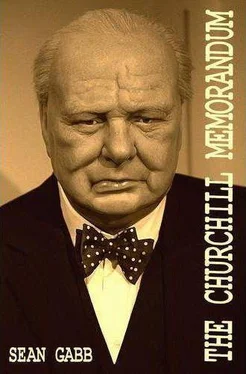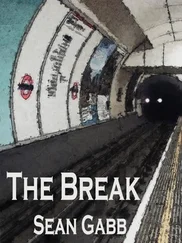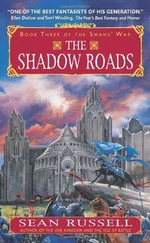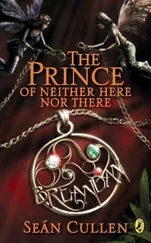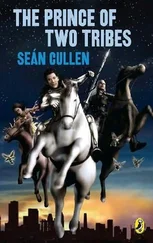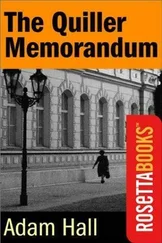I tried to get up. But my legs wouldn’t work. Naked, I huddled myself back into a ball on the sitting room carpet and began to cry. Not very dignified, you may think. But it saved me the trouble of trying to work out what had just happened.
The next thing I distinctly recall is the glass of spirits Pakeshi held against my lips.
“In my professional opinion,” he was saying—“a professional opinion attested by more than one degree—it is highly probable that these men are dead.” I looked at the body of the smaller man. There was a large hole in his forehead where the bullet had entered. His face still carried a look of surprise. The whole back of his head was missing, and there was a spreading puddle on the carpet where he lay. “All that my diagnosis could possibly want,” Pakeshi went on, “is some indication of who these men were, and of who might have killed them.”
Ignoring him, I reached again for my towel. It had fallen off on my retreat to the wall. Now it was splashed with blood. Even so, I wrapped it about myself as I stood up. Still shaking, I took a step towards the bathroom, where I’d left my cigarettes. Where I’d been sitting, there was just the overpowering smell of cordite. Now I sniffed the air.
“Have you been smoking cannabis?” I asked with an irrelevant giggle. There was still cordite in the air—and now the usual smell of curry that indicated Pakeshi was within a ten foot radius. But no one can mistake the dry and aromatic smell of cannabis.
“Now, just you tell me, Anthony,” he smirked back at me, “what a man in my position should be doing with a sedative that can be bought in any tobacconist.” His face would have lit up with the smile that spread over it—except his eyes were cold and were looking very carefully in my direction. How a greasy, fat wog in late middle age could keep such presence of mind was something I’d consider in due course. He should have been the one ready to void his bowels—not me. As it was, he stood with easy assurance just a few feet from me. He uncocked his revolver and pushed it carefully into his trouser pocket. I made another effort to pull myself together, and sniffed the air again.
And it was cannabis. You really don’t mistake that for anything else. I thought again of my cigarettes. I felt the need of something for my nerves, and I needed to give some indication in front of Pakeshi that I was in control of myself. I didn’t make it to the bathroom. I had another look at the body of the smaller man. His spectacles had come off. What I’d taken for the scar on his face, I could now see, was simply stuck on. Ignore the hole in his forehead, forget about the fake scar—and I was looking straight at the man who’d lit my cigarette outside Foyles the previous afternoon.
I looked again at Pakeshi’s stony face and tried to say something. Instead, I collapsed onto the settee and vomited into my towel. I was dimly aware of a shrill screaming from somewhere beyond the still open front door.
I lit another cigarette and stared defiantly ahead. Inspector O’Brien sighed and relit his pipe.
“Now, Dr Markham,” he said gently, “if you really want a solicitor, we can sit here until one can be found. However, I must remind you that you aren’t under arrest. All I’d like is some answers.”
“I didn’t kill anyone,” I said quickly. “If my prints are on the gun, it’s because I picked it up.” O’Brien sat back, his battered face now faintly impatient. He shook his head at the policewoman who sat beside him. She put her pencil down and looked at the wall.
“Dr Markham,” he said again, “this is not a television play, and we are not completely stupid. The only gun we recovered from your flat was a .22. The shots that killed your intruders were fired from something much larger. Now, since we are not accusing you of anything at all, can you please try answering some of my questions?” I could have replied that I’d answered every question that I was able to answer—first to the uniformed officers who’d turned up at the flat, then to his younger colleague at the station, and now to him. But he had a senior look about him—everyone else, to be sure, had been very deferential—and I didn’t feel up to another argument.
I looked down at the cigarette. My hands were shaking again. Despite the blast from the radiator in that interview room, they were cold as ice. I gathered my thoughts and explained again about the smell of cannabis. O’Brien’s face took on a pitying look, and he tapped the message that had been brought in ten minutes before.
“I told you,” he said, “we’ve checked with Imperial Airways. There was no Major Stanhope booked on your flight. We’ve also checked with the India Office. The only Reginald Stanhope on record is a foreman in the rope factory at Calcutta Dockyard.”
“But what about witnesses?” I cried. My voice came out as a tight squawk. I stopped and took another deep breath, and then a drag on my cigarette. “Everyone saw him. He was an old, fat man, with an artificial right arm.” O’Brien waited for me to stop. He leaned forward across the table.
“That, of course, is something we shall look into,” he said firmly. “For the moment, the facts are as they are. Whatever you say about a smell of cannabis in your flat—and this is hardly decisive evidence—we have no reason to believe that your intruders were shot by a one-armed old man with whom you may have travelled from New York. Two grouped kills with that precision aren’t things one associates with an aged left hand.
“Now, can we put aside these particular suppositions, and go back to the matter of what these men may have wanted?” I shook my head. I didn’t need confirmation that they’d been foreigners. Besides, Pakeshi had been through the smaller one’s pockets, and pulled out a German identity card. Beyond that, I was as much in the dark as the police.
O’Brien got up and went over to a chair against the far wall. Draped over it was a German flag. The black swastika in the centre still showed clearly enough. The red and white, though, were splashed with brown gore. He held it up for my inspection, then rearranged it on the chair.
“It’s fair to assume that this was intended to be left beside you, or even covering your body,” he said. “Or is it possible that they didn’t intend to kill you, but were planning instead to take you somewhere and leave the flag behind?” I swallowed hard and waited for O’Brien to come and resume his seat opposite me. “Or is it possible, sir, these men were angry with you?” he asked with a change of tone. I looked back in confusion. O’Brien smiled politely. “I didn’t read your book about Churchill. But I am aware of the articles you wrote for The Daily Express last September. Your speculations on how things might have turned out had Churchill been Prime Minister when the Germans wanted to break up Czechoslovakia were most interesting. I believe they were the subject of sharp complaints in the German press.
“Do you really believe the world would be a better place had we gone to war with Germany?” he asked suddenly. It was an odd question for a police officer to ask. But it put me firmly on my own territory, and I felt calmer than at any moment since I’d got out of my bath. If I didn’t believe it any more, I could certainly put the case.
“It is arguable,” I said carefully, “that, with Germany crushed, we could have taken a firmer line in the Near East. We could have stopped the emergence of the Jewish Free State as a German satellite, and kept Turkey from renewing its alliance with Germany. We’d certainly not have signed the Petroleum Accord that stopped the development of oil as a replacement for coal. The alternatives we had to develop were less convenient than cheap, unlimited oil would have been.”
Читать дальше
